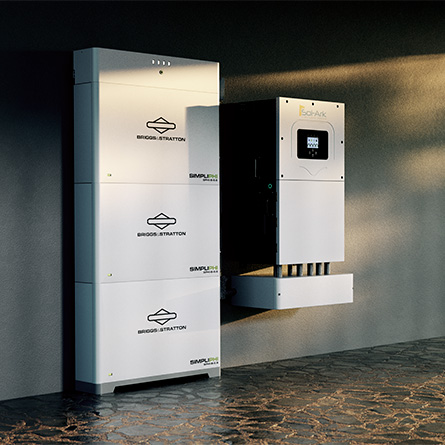Our battery system's key strength is its flexibility, as families can upgrade capacity as their family size and load demands change.
Whilst living off the grid seems to be the dream for many households that are tired of large power bills and the ever-increasing prices of electricity, those already living off the grid face these day-to-day realities of solar power:
- Low solar input in winter
- Balancing battery capacity and costs
- Running of noisy and expensive generators
For one off-grid household in Dereel (near Ballarat, Victoria), their aging and tired flooded cell battery pack required them to run their 6.5kVA generator anywhere between 10 and 20 hours a week throughout the year.
Ballarat-based renewable energy enterprise, Re-Energy, worked with the homeowner to find a solution. Once all the options were considered, the Re-Energy team proposed a two-stage solution.
- Replace the bulky and weak flooded lead-acid batteries with three compact PHI OES 3.4kWh 48V Lithium Ferrous Phosphate batteries that were, by design, easy to expand in capacity.
- Add LG 275-watt Mono X Solar Panels to boost generation capability.
The pack that was removed was designed to provide 9kWh. But being almost 7 years old, had more than one weak cell and was unable to deliver what was expected of it.
The SimpliPhi battery pack can supply 9kWh at 90% depth of discharge and has a life of about 5,000 cycles, with a 10-year warranty. This increases to 10,000 cycles if set at an 80% depth of discharge.
The customer has now moved onto a smaller generator, which is configured for auto-start and runs briefly on days when there is inadequate solar output. Having used the PHI battery pack for a number of months now, the customer is considering the addition of one more PHI OES 3.4 battery to cover larger loads during the winter. Simply adding another battery to an existing battery bank is never possible with lead-acid batteries. The cost of swapping from traditional lead-acid batteries to the PHI battery packs was marginally higher; however, the benefits offered make that extra money spent an investment in future-proofing their family’s power requirements.
The old inverter/charger was upgraded to a Schneider Conext SW4048 and accessorized with an automatic generator start module (AGS) and system control panel (SCP).
The addition of the AGS has eliminated the need for the customer to go out and manually start the generator when needed, and the SCP mounted in the house gives him a snapshot of his power usage/generation/generator import in an easy-to-access location.
With a round trip efficiency of 98% for the PHI OES 3.4 units – higher than the lead-acid system even when new – the overall efficiency of the system has improved. While there is inadequate measured data to quantify this claim, anecdotal evidence suggests this is indeed the case. This is suspected to be adding more effective generation capacity from the solar panels each day due to lower losses in the system.
A further advantage of our battery system is the ease with which additional storage units can be added in parallel with the existing units. This is simply not possible with lead-acid batteries, as they are linked in series, not in parallel. Whilst some rewiring will be required, it is nowhere near as expensive as replacing or adding an entire lead-acid battery pack.
Flexibility is a key strength of our battery system, as families can upgrade capacity as family size and load demands change.
BEFORE: Wet Cell Pack
Capacity – 48V 1380AH
Daily Dischargeable Limit – 9kWh or 15% of installed capacity.
- Generator was being run twice a day for anywhere between 2 – 4 hrs.
- Maintenance of batteries and generator was a sizable ongoing cost.
- Due to dedicated battery charger a larger 6.5kVA generator was being used to top up batteries with increased running costs.


AFTER: SimpliPhi PHI 3.4 x 3
Capacity – 10.2kWh
Dischargeable
- Existing inverter replaced with SW4048 to leverage integrated inverter and battery charger.
- Smaller 2.8kVA generator being used for top up of charge and supply to the residence if required now.
- Generator has been run twice (two weeks) since installation of the new battery pack and inverter

Ready to experience true energy independence?
Request a consultation with a Briggs & Stratton dealer or installer near you by clicking the button below.



